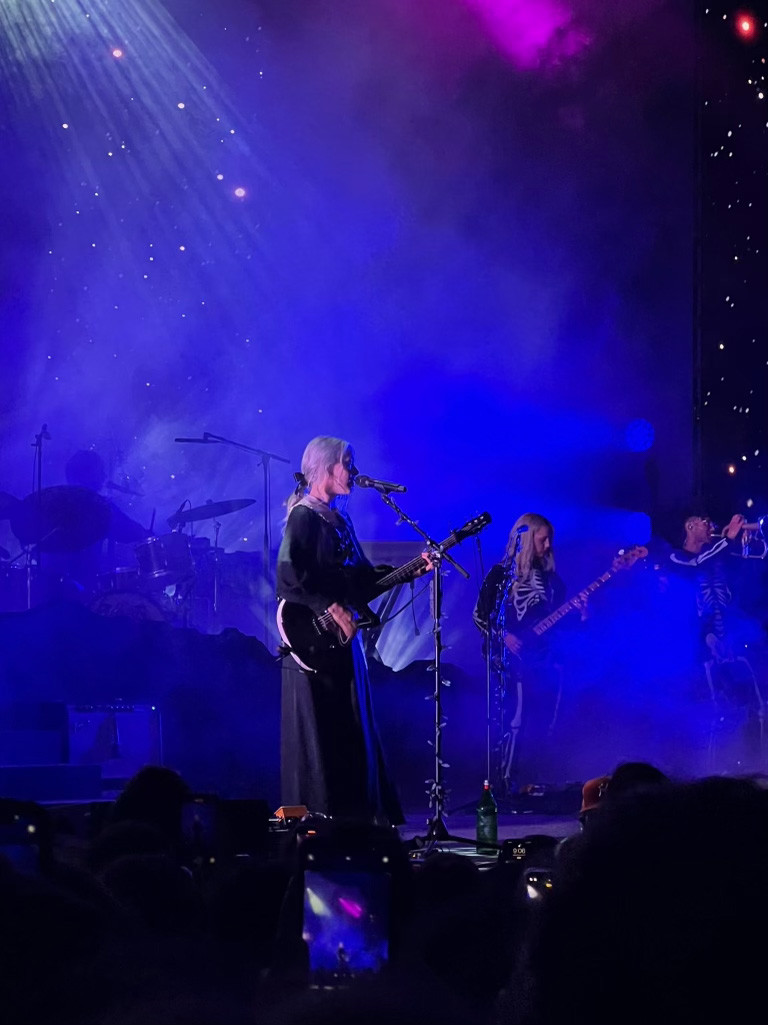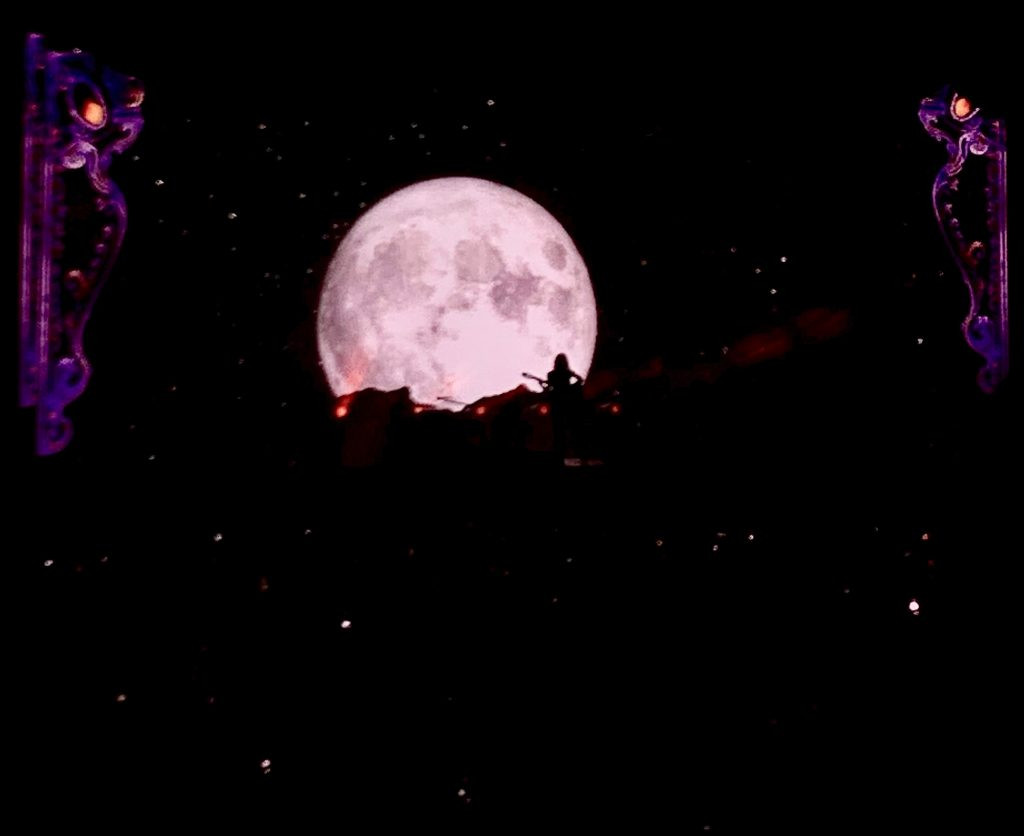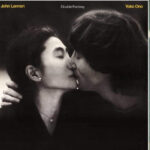Experiencing Phoebe Bridgers perform live is transformative, and this past summer, witnessing her twice amplified my profound connection to “Moon Song.” Bathed in swirling, multicolored lights and enveloped in stage fog, her concerts felt like collective plunges into the depths of melancholic beauty. Bridgers’ ethereal vocals, combined with her subtly rebellious stage presence and the raw emotion poured into every lyric, solidify what it means to be a devoted “Pharb.” When the crowd roared the final verse of “Moon Song,” a palpable mix of anticipation and cathartic release filled the air, creating a sense of shared intimacy. Hearing it live elevated “Moon Song” from a potentially overlooked album track to an essential part of any late-night drive playlist—a song deserving of profound exploration.
 Phoebe Bridgers performing in Prospect Park
Phoebe Bridgers performing in Prospect Park
“Phoebe Bridgers captivates the audience in Prospect Park with her poignant performance.”
“Moon Song,” the seventh track on Phoebe Bridgers’ critically acclaimed album Punisher, delicately unpacks the bittersweet ache of a past relationship, one lingering with the possibility of rekindled flames. This captivating and heartbreaking ballad showcases Bridgers’ lyrical genius through evocative metaphors that explore themes of yearning and unwavering devotion. Characterized by melancholic guitar melodies intertwined with Bridgers’ signature wistful vocals and poignant lyricism, “Moon Song” stands out as a cornerstone of her celebrated discography.
The track subtly begins with the haunting sound of owl hoots, setting a nocturnal and introspective atmosphere, before the opening lines emerge:
You asked to walk me home
But I had to carry you
These lines paint a picture of a night concluding after drinks, where an offer to walk home is made. While Bridgers is capable and independent, she seemingly agrees out of obligation or perhaps a lingering hope for connection. However, the dynamic quickly shifts as she finds herself burdened, metaphorically “carrying” her inebriated companion through the night. This immediately establishes a sense of imbalance and perhaps foreshadows the relationship’s challenges.
And you pushed me in
And now my feet can’t touch the bottom of you
Bridgers employs the powerful metaphor of being pushed into a dark pool to describe the relationship’s trajectory. She felt drawn into a romance for which she was unprepared, leading to a loss of control and a feeling of being overwhelmed. Night swimming, with its inherent mystery and unknown depths, perfectly illustrates the uncertainty and potential danger of this romantic entanglement. This metaphor reinforces the earlier image of Bridgers bearing the weight, suggesting she was navigating a relationship where she felt out of her depth and unsupported.
Moving into the second verse, Bridgers confronts a pivotal moment of betrayal:
You couldn’t have
You couldn’t have
Stuck your tongue down the throat of somebody
Who loves you more
The repetition of “you couldn’t have” underscores a sense of disbelief and denial regarding the infidelity. Despite recognizing the relationship’s instability, Bridgers believed in the depth of her own love. The visceral imagery of “stuck your tongue down the throat” emphasizes the intimate and invasive nature of the betrayal. The line “somebody who loves you more” is a stark declaration of her unwavering affection, highlighting the painful contrast between her devotion and her partner’s actions. The thought of her lover’s intimacy with another inflicts profound emotional pain, a sharp, physical ache in her chest.
Bridgers then shifts to a tone tinged with hope and resignation:
So I will wait for the next time you want me
Like a dog with a bird at your door
Mmm
Here, Bridgers expresses a desire for something currently unattainable, accepting a passive role as she waits for another chance. She envisions herself as a dog, a timeless symbol of loyalty and unwavering devotion, patiently waiting at the door. The “bird” becomes a symbolic offering, a token of affection or a peace offering intended to reignite the relationship. The concluding “mmm,” resembling a dog’s soft whimper, adds a layer of vulnerability and longing, a silent plea for affection and acceptance. This imagery of the dog and bird will reappear, deepening its significance later in the song.
Bridgers then transitions into shared, specific memories, beginning with a quirky commonality: their mutual dislike for Eric Clapton’s “Tears In Heaven”:
We hate “Tears In Heaven”
But it’s sad that his baby died
Despite acknowledging the tragic backstory of Clapton’s song—written in remembrance of his deceased son—they both find themselves unable to connect with it. This shared aversion, despite the song’s somber context, becomes an unexpected point of connection, a bond formed through shared dislike rather than shared appreciation. It’s a subtle yet intimate detail that hints at the complexities of their shared experiences.
However, this harmony is juxtaposed with conflict when John Lennon is brought up:
And we fought about John Lennon
Until I cried
And then went to bed upset
The reason for their disagreement about Lennon remains ambiguous, but Bridgers has publicly stated Lennon is her favorite Beatle and a significant influence. Her emotional reaction, crying and going to bed upset, suggests the argument was deeply personal and emotionally charged. Lennon’s song “Beautiful Boy,” a tender lullaby to his son Sean, embodies unconditional love and comfort. Perhaps the argument touched upon themes of parental love, vulnerability, or artistic interpretation that resonated deeply with Bridgers, leaving her feeling emotionally raw and seeking the kind of solace Lennon offered his son.
Bridgers then shifts to a dreamlike state, offering a glimpse into her subconscious desires:
But now I am dreaming
And you’re singing at my birthday
And I’ve never seen you smiling so big
She paints a vivid dreamscape: surrounded by loved ones, illuminated by birthday cake candles, and most importantly, her love interest is present, radiating an unusually bright smile. While ostensibly a dream about a birthday party, the focus is undeniably on her lover’s happiness. She then adds a seemingly whimsical detail: “It’s nautical themed.” This seemingly random detail could be an inside joke, a shared memory, or a symbol imbued with deeper meaning within their relationship. Interestingly, a nautical theme appears in another song from Bridgers’ debut album, Stranger in the Alps, “Funeral,” where she sings:
And I have this dream where I’m screaming underwater
While my friends are waving from the shore
In “Funeral,” the marine imagery represents isolation and a disconnect from loved ones, whereas in “Moon Song,” the nautical theme is integrated into a dream of celebration and connection. The moon’s gravitational pull on the ocean, creating tides of ebb and flow, mirrors the fluctuating emotions and dynamics within Bridgers’ relationships, reflected in her dream imagery.
In the final verse, Bridgers circles back to the dream, highlighting its ephemeral and fragmented nature:
And there’s something I’m supposed to say
But can’t for the life of me
Remember what it is
The fading details of a dream are a common experience, and here, Bridgers captures the frustrating elusiveness of dream recollection. She has become so immersed in the idealized, happy moments of the dream with her love interest that the preceding conflict and pain seem to recede, highlighting her tendency to romanticize the past and perhaps live in a form of denial.
 Phoebe Bridgers performing "Moon Song" at Forest Hills Stadium
Phoebe Bridgers performing "Moon Song" at Forest Hills Stadium
“Phoebe Bridgers delivers a powerful rendition of ‘Moon Song’ under the stage lights at Forest Hills Stadium.”
After verses filled with nocturnal imagery and introspective reflections, the “moon” finally emerges explicitly in the chorus:
And if I could give you the moon
I would give you the moon
The act of gifting the moon is, of course, physically impossible, making it a potent symbol of ultimate devotion and an extravagant, albeit unattainable, promise. It’s a gesture of boundless love, signifying a willingness to offer anything, even the cosmos itself. Interestingly, the name “Phoebe” itself originates from the Greek “Phoibe,” the name of a Titan associated with the moon. This etymological connection subtly reinforces the idea that Bridgers, in essence, would give her very being, represented by her namesake linked to the moon, for this person. Despite its brevity and lack of repetition, the chorus’s two lines resonate deeply, leaving a lingering emotional weight.
Bridgers intensifies the emotional impact further with an even more devastating outro:
You are sick and you’re married
And you might be dying
This starkly shifts the timeline, transporting the listener to a future where her love interest is married to someone else and facing mortality. Bridgers observes from the “Sidelines”—a nod to another poignant song in her repertoire—a detached observer of a life she envisioned sharing. This glimpse into a future where she is not present in her former lover’s life amplifies the sense of loss and unrealized potential. She grapples with the pain of watching someone she deeply cared for grow old and face life’s inevitable challenges with another partner.
The recurring water motif resurfaces in the penultimate line:
But you’re holding me like water in your hands
Holding water in cupped hands demands delicate attention and unwavering steadiness; any misstep can lead to spillage and loss. Bridgers uses this metaphor to describe her own emotional fragility and sensitivity. When trust is broken by those she holds dear, she feels as though her emotional state is precarious and easily shattered.
The dog and bird metaphor returns, bringing the song full circle and culminating in a heart-wrenching conclusion:
When you saw the dead little bird
You started crying
But you know the killer doesn’t understand
The dog, representing Bridgers and her devoted efforts, retrieves the bird—the symbolic “moon” or token of affection—for her owner, her love interest. However, the owner’s reaction to the dead bird is not appreciation but sorrow and tears. The “killer,” the dog, misunderstands the situation, viewing it as an act of love and loyalty, while the owner perceives it as a tragic loss. In Bridgers’ context, she feels misunderstood and inadequate despite her unwavering devotion. She could offer her entire self, symbolized by the impossible gift of the moon, yet still fail to bridge the emotional gap or prevent heartbreak. This echoes themes in “Killer” from Stranger in the Alps, where she grapples with a self-perception as destructive or inherently flawed, singing of “being hungry for blood” and “giving all of my love” in a potentially damaging way.
“Moon Song” ultimately encapsulates the profound lengths one will go to for love, highlighting how deep devotion can drive us to strive for the impossible, even when faced with misunderstanding and heartbreak. It’s a testament to Phoebe Bridgers’ ability to articulate complex emotions with raw vulnerability and poetic imagery, solidifying “moon song” as a standout track in her emotionally resonant body of work.

